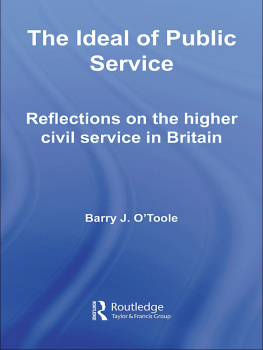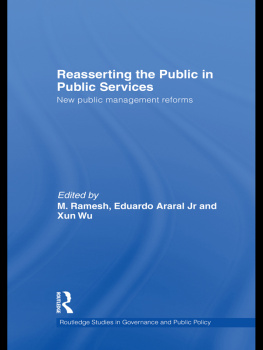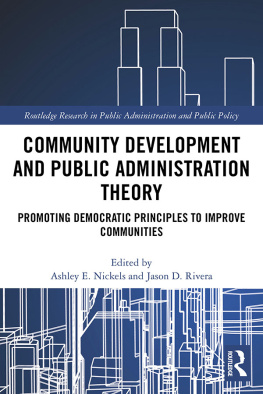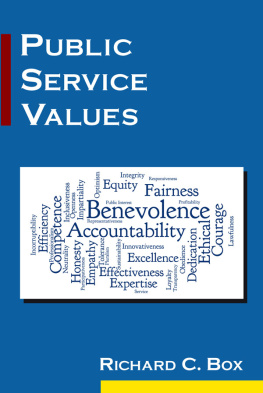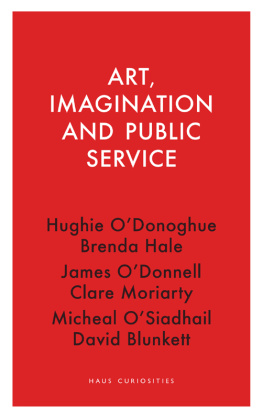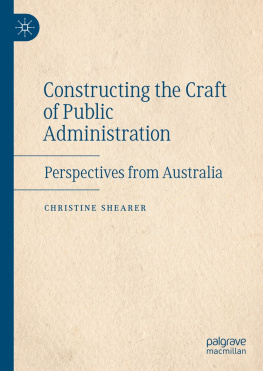The Ideal of Public Service
This new book offers an informed and controversial examination of the ethics of higher civil servants in Britain and the ways in which they have been undermined by recent developments in public administration.
How should public servants behave? How should they be encouraged to think ethically? How should they be motivated to do so? Focussing on the role of public service, public duty and the public interest in the twenty-first century, Barry OToole seeks to answer these important questions in the context of new public management, the increasingly important role of special advisers and the decline of the public service ethos since the 1970s.
The Ideal of Public Service explores some of the key contributions to the development of ideas about public service in British central administration and provides a discussion of recent trends in administrative practice in the United Kingdom. Combining political theory and an analysis of the history and development of the civil service, this timely book will be of strong interest to those researching British Politics, Governance and Public Policy.
Barry J. OToole is Reader in Politics at the University of Glasgow, UK. He has written widely on public service ethics, including his major book Private Gain and Public Service (Routledge, 1989).
Routledge Studies in Governance andPublic Policy
1 Public Sector Ethics
Finding and implementing values
Edited by Charles Sampford and Noel Preston with Carol-Anne Bois
2 Ethics and Political Practice
Perspectives on legislative ethics
Edited by Noel Preston and Charles Sampford with Carol-Anne Bois
3 Why Does Policy Change?
Lessons from British
Transport Policy 194599
Jeremy Richardson and Geoffrey Dudley
4 Social Relations and Social Exclusion
Rethinking political economy
Peter Somerville
5 Local Partnerships and Social Exclusion in the European Union
New forms of local social governance?
Edited by Mike Geddes and John Benington
6 Local Governance in England and France
Alistair Cole and Peter John
7 Politicization of the Civil Service in Comparative Perspective
The quest for control
Edited by B. Guy Peters and Jon Pierre
8 Urban Governance and Democracy
Leadership and community involvement
Edited by Michael Haus, Hubert Heinelt and Murray Stewart
9 Legitimacy and Urban Governance
A cross-national comparative study
Edited by Hubert Heinelt, David Sweeting and Panagiotis Getimis
10 The Ideal of Public Service
Reflections on the higher civil service in Britain
Barry J. OToole
The Ideal of Public
Service
Reflections on the higher civil service in Britain
Barry J. OToole
First published 2006
by Routledge
2 Park Square, Milton Park, Abingdon, Oxon OX14 4RN
Simultaneously published in the USA and Canada
by Routledge
270 Madison Ave, New York, NY 10016
Routledge is an imprint of the Taylor & Francis Group, an informa business
2006 Barry J. OToole
This edition published in the Taylor & Francis e-Library, 2006.
To purchase your own copy of this or any of Taylor & Francis or Routledges collection of thousands of eBooks please go to www.eBookstore.tandf.co.uk.
All rights reserved. No part of this book may be reprinted or reproduced or utilised in any form or by any electronic, mechanical, or other means, now known or hereafter invented, including photocopying and recording, or in any information storage or retrieval system, without permission in writing from the publishers.
The publisher makes no representation, express or implied, with regard to the accuracy of the information contained in this book and cannot accept any legal responsibility or liability for any errors or omissions that may be made.
British Library Cataloguing in Publication Data
A catalogue record for this book is available from the British Library
Library of Congress Cataloging in Publication Data
A catalog record for this book has been requested
ISBN10: 0-714-65482-5 (hbk)
ISBN10: 0-203-49813-5 (ebk)
ISBN13: 978-0-714-65482-9 (hbk)
eISBN: 978-1-13577-099-0
ISBN13: 978-0-203-49813-2 (ebk)
Preface
I have been interested in public service ethics throughout my academic career. My first book, Private Gain and Public Service (Routledge, 1989), explored some of the questions raised in this book, but from the perspective of the development of the First Division Association as a trade union. I have also written widely on other aspects of the ethics of higher civil servants in Britain including, for example, my article in Public Administration on T. H. Green and the Ethics of Senior Officials in British Central Government (vol. 68, pp. 33752) or the chapter entitled We Walk by Faith, Not by sight: the public service ethic in the book I edited with Michael Hunt, Reform, Ethics and Leadership in Public Service (Ashgate, 1998).
This book may be seen as the culmination of my work on the ethics of higher civil servants in Britain. It brings together some of the themes I have developed over the past 20 years or so with reflections on the state of the higher civil service in Britain now. It also sets current events and reforms in a historical and a normative theoretical context. Thus, Chapter 2 deals with ideas of public service and the public interest from the perspective of political theorists, both ancient and modern. Chapter 3 traces the development of the civil service in the nineteenth and twentieth centuries and the concomitant development of the public service ethos in the higher civil service inspired, as it was, by the ideal of public service as espoused by these philosophers. Chapter 4 is about more recent structural changes and the fundamental shift away from ideas of the public interest. Chapter 5 reflects upon these changes, which are not simply administratively important, but of great constitutional significance. In essence, my argument is that those who occupy the highest positions in government, ministers, special advisers and civil servants, no longer seem to have any sense of the public interest, seem not to be guided by an ideal of public service and do not have any incentive to think in these terms.
The book is polemical and intended to be controversial. Nevertheless, it is intended to be a scholarly contribution to the literature. It is based largely on public documents and on other original material. It is not a comprehensive review of the literature. I have not referred to many admirable scholarly works on the subject, for example, those by Peter Barberis or Frank Carr in Public Policy and Administration (2001 and 1999, respectively), or by John Greenaway in Public Administration (1995), or by Demetrios Argyriades in The International Review of Administrative Sciences (2003). Nor have I referred to many of the important works in relation to connected material, for example, Geoffrey Marshall or Diana Woodhouse on ministerial accountability, or Rod Rhodes on the changing nature of working in the core executive. The purpose has not been to regurgitate the thoughts of others, or to refer to other works simply for the sake of doing so, but to offer my own reflections, based on the observations and publications of public servants in public documents and in related archives. There has been no intention to present new theoretical insights from a social science perspective; nor have I sought to invent a new methodology or typology or model; nor has the intention been to invent or resort to the obfuscating jargon that mars so much of modern writing in the social sciences. The purpose has simply been to present an argument, to present it in English, and in so doing to contribute to the scholarly literature on public administration. The hope is that what I have said will engage people in an important debate about our public service.

